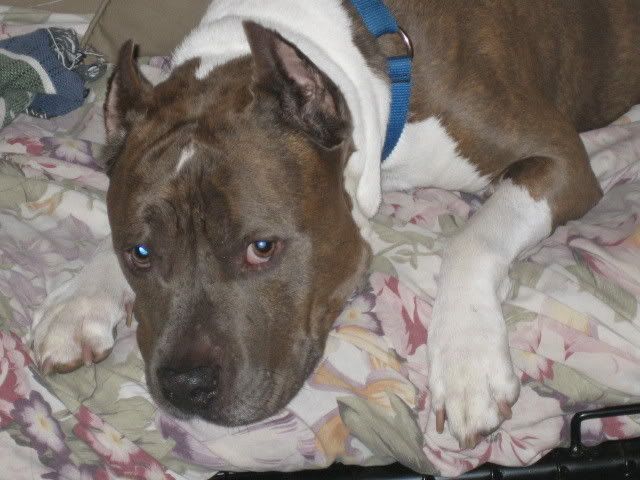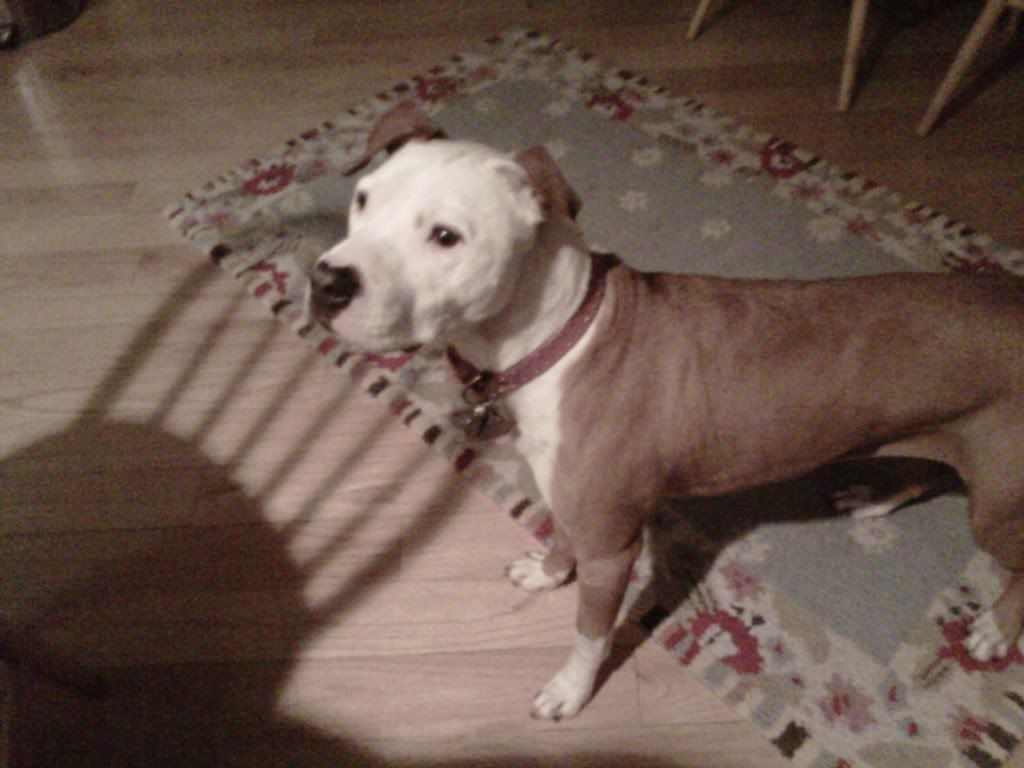Post by RealPitBull on Nov 15, 2013 11:58:51 GMT -5
Real Housewives of Beverly Hills': Is Kim's dog trainer abusive?
By Molly Chance
November 14, 2013 2:36 PM ET
The Real Housewives of Be...
Thu 11/14 5:00 PM EDT (Bravo)
Fri 11/15 12:30 AM EDT (Bravo)
On this week's episode of "The Real Housewives of Beverly Hills," Kim Richards brings in a dog trainer to help her get her pit bull Kingsley under control.
The ensuing segment set off the ire of many pet-loving viewers, who took to the show's website and Facebook page to express their outrage.
"My dog has eaten thousands of dollars of shoes, sunglasses and personal items," Kim says. "And I just think we need a trainer."
But a trainer who kicks your dog and causes him to shake, Kim?
"Real Housewives" fans left comments on Facebook calling the trainer, David Utter, an "idiot," and a "bully." Viewers say the training segment was "disgusting" and left one fan sick to her stomach. Some characterized the situation that played out on-screen as "animal abuse" and insist the show should be held responsible.
To recap, David kicked Kingsley repeatedly, then yelled and hit at the dog when he was approached. Kim admitted she was scared by David's approach and was concerned that Kingsley was shaking. Then she went ahead and took David's advice to knee the dog over and over to assert her dominance over him.
At one point, Kim and her son Chad sandwiched Kingsley between them and simultaneously kneed him in the ribs over and over again. The trainer also instructed Kim to grab the dog forcefully by the neck to make him sit.
Award-winning dog trainer and nationally recognized dog behavior consultant Jonathan Klein, who runs the Los Angeles-based "I Said Sit!" School for Dogs, tells Zap2it he agrees with many of the upset viewers.
"Training with force and pain is just plain wrong," says Klein. "It's actually the cause of aggression in so many cases. Kim is lucky the instruction to grab the collar and yank didn't cause her to be bitten herself." Klein says, "Teaching fear is abuse, and suppressing behavior by intimidation is abuse." He believes good dog training is "built on trust and cooperation -- not on fear, dominance or intimidation."
So what would Klein have done differently in this scenario? "I would have waited to greet Kingsley until he was comfortable with me," he says. "If a dog is scared, I usually offer food by tossing it where the dog can reach the food without having to come to me as it builds trust."
As far as the chewing up of Kim's pricey accessories, Klein says he would "start by asking a little more about what, when and how the behavior was noticed. Then I would start with some simple management and access limitations. What that means is put your shoes and sunglasses where the dog cant get them, and put the dog where it not only cant do damage, but more importantly, feels safe, secure and relaxed."
And how about that big, mean man who came through the door and started kicking Kingsley and scaring Kim?
"It's an owner's obligation to be their dog's advocate," Klein explains. "When you see a dog trainer doing something that you think does not make sense, or gives you a bad feeling, stop it right away. At that moment, the most important thing is to help the dog recover as quickly as possible. Get the dog away from the scary stranger, reassure it and get its mind on something more pleasant. Food or a toy might get Kingsley in a more relaxed state. You can't stress and have fun at the same time. Distance -- Safety -- Comfort -- Reassurance -- would have been my instantaneous reactions. Then I would get rid of anyone who treated my animal like that and make sure it never happened again."
But not Kim; no sir. Her response to the trainer scaring the heck out her and her pit bull? "If I have to bump the dog, and kind of thump him to the left? After that, I'l thunk ya. I'll thunk the s*** out of [Kingsley]." (Uh, paging the ASPCA ...)
"The trainer was brought in because of a chewing problem, and by the time he left, the dog had exhibited aggression to dogs and humans," Klein points out. "What's even worse is that method only works if everyone is able to do it. So instead of teaching the dog good behavior that it can use with all people, the dog will only mind people who can overpower him, and for Kingsley there aren't many people.
"There are several better methods -- the least of which being delaying greetings for a few minutes until the dog is calm, offering rewards (or any attention) only when the dog is behaving the way you want (relaxed with 4 feet on the floor), or an even better approach is redirecting the dog to perform a desirable behavior that you have taught him, like to greet people sitting. ... Kim asked for help, and it is so sad that she didn't get any."
What's even sadder is Kim's precious Kingsley seems to have been hurt more than helped by this on-camera escapade. A Bravo spokesperson declined to comment on the abuse allegations. What do you think about Utter and his dog training approach? Sound off in the comments section below.
In the meantime, check out Klein's blog "The Science of Dog Training" for more on his positive-based approach and "The Perils of Punishment."
Follow Zap2it on Twitter and Zap2it on Facebook for the latest news and buzz
Photo/Video credit: Twitter, Bravo
By Molly Chance
November 14, 2013 2:36 PM ET
The Real Housewives of Be...
Thu 11/14 5:00 PM EDT (Bravo)
Fri 11/15 12:30 AM EDT (Bravo)
On this week's episode of "The Real Housewives of Beverly Hills," Kim Richards brings in a dog trainer to help her get her pit bull Kingsley under control.
The ensuing segment set off the ire of many pet-loving viewers, who took to the show's website and Facebook page to express their outrage.
"My dog has eaten thousands of dollars of shoes, sunglasses and personal items," Kim says. "And I just think we need a trainer."
But a trainer who kicks your dog and causes him to shake, Kim?
"Real Housewives" fans left comments on Facebook calling the trainer, David Utter, an "idiot," and a "bully." Viewers say the training segment was "disgusting" and left one fan sick to her stomach. Some characterized the situation that played out on-screen as "animal abuse" and insist the show should be held responsible.
To recap, David kicked Kingsley repeatedly, then yelled and hit at the dog when he was approached. Kim admitted she was scared by David's approach and was concerned that Kingsley was shaking. Then she went ahead and took David's advice to knee the dog over and over to assert her dominance over him.
At one point, Kim and her son Chad sandwiched Kingsley between them and simultaneously kneed him in the ribs over and over again. The trainer also instructed Kim to grab the dog forcefully by the neck to make him sit.
Award-winning dog trainer and nationally recognized dog behavior consultant Jonathan Klein, who runs the Los Angeles-based "I Said Sit!" School for Dogs, tells Zap2it he agrees with many of the upset viewers.
"Training with force and pain is just plain wrong," says Klein. "It's actually the cause of aggression in so many cases. Kim is lucky the instruction to grab the collar and yank didn't cause her to be bitten herself." Klein says, "Teaching fear is abuse, and suppressing behavior by intimidation is abuse." He believes good dog training is "built on trust and cooperation -- not on fear, dominance or intimidation."
So what would Klein have done differently in this scenario? "I would have waited to greet Kingsley until he was comfortable with me," he says. "If a dog is scared, I usually offer food by tossing it where the dog can reach the food without having to come to me as it builds trust."
As far as the chewing up of Kim's pricey accessories, Klein says he would "start by asking a little more about what, when and how the behavior was noticed. Then I would start with some simple management and access limitations. What that means is put your shoes and sunglasses where the dog cant get them, and put the dog where it not only cant do damage, but more importantly, feels safe, secure and relaxed."
And how about that big, mean man who came through the door and started kicking Kingsley and scaring Kim?
"It's an owner's obligation to be their dog's advocate," Klein explains. "When you see a dog trainer doing something that you think does not make sense, or gives you a bad feeling, stop it right away. At that moment, the most important thing is to help the dog recover as quickly as possible. Get the dog away from the scary stranger, reassure it and get its mind on something more pleasant. Food or a toy might get Kingsley in a more relaxed state. You can't stress and have fun at the same time. Distance -- Safety -- Comfort -- Reassurance -- would have been my instantaneous reactions. Then I would get rid of anyone who treated my animal like that and make sure it never happened again."
But not Kim; no sir. Her response to the trainer scaring the heck out her and her pit bull? "If I have to bump the dog, and kind of thump him to the left? After that, I'l thunk ya. I'll thunk the s*** out of [Kingsley]." (Uh, paging the ASPCA ...)
"The trainer was brought in because of a chewing problem, and by the time he left, the dog had exhibited aggression to dogs and humans," Klein points out. "What's even worse is that method only works if everyone is able to do it. So instead of teaching the dog good behavior that it can use with all people, the dog will only mind people who can overpower him, and for Kingsley there aren't many people.
"There are several better methods -- the least of which being delaying greetings for a few minutes until the dog is calm, offering rewards (or any attention) only when the dog is behaving the way you want (relaxed with 4 feet on the floor), or an even better approach is redirecting the dog to perform a desirable behavior that you have taught him, like to greet people sitting. ... Kim asked for help, and it is so sad that she didn't get any."
What's even sadder is Kim's precious Kingsley seems to have been hurt more than helped by this on-camera escapade. A Bravo spokesperson declined to comment on the abuse allegations. What do you think about Utter and his dog training approach? Sound off in the comments section below.
In the meantime, check out Klein's blog "The Science of Dog Training" for more on his positive-based approach and "The Perils of Punishment."
Follow Zap2it on Twitter and Zap2it on Facebook for the latest news and buzz
Photo/Video credit: Twitter, Bravo





 I look forward to learning much here
I look forward to learning much here